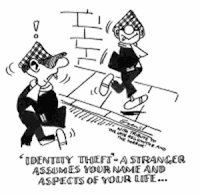 According to the Federal Trade Commission, 9 million Americans become victims of identity theft every year. Someone may obtain a credit card in your name and spend thousands of dollars for which you get billed; someone may rent an apartment using your personal information, and you get billed or harassed by debt collectors; in the worst cases, a crime may be committed using your name, social security number or other personal information.
According to the Federal Trade Commission, 9 million Americans become victims of identity theft every year. Someone may obtain a credit card in your name and spend thousands of dollars for which you get billed; someone may rent an apartment using your personal information, and you get billed or harassed by debt collectors; in the worst cases, a crime may be committed using your name, social security number or other personal information.Identity theft can be a very serious issue. If you are a victim, you may have to spend considerable time and money repairing the damage to your name and your credit record. You may not be able to secure education loans or other kinds of funding, and you may be denied jobs for which you qualify otherwise. In the very worst case, you may even be jailed for a crime you did not commit.
People can steal your identity in many ways. They can steal it directly from you; a misplaced wallet, unlocked personal office, lack of online precaution can all result in identity thefts. They can also do this in more ingenious ways. Dumpster diving is one way; thieves rummage through trash in dumpsters and look for old bills or other documents with financial and personal information. There are also social engineering methods like phishing, and also offline methods like diverting your address to get your personal documents, or pretexting, calling up institutions on some pretext to get your information.
In order to avoid identity theft, you should first know how it is done. That way, you will develop your own precautionary measures to stop the theft. Here are also some standard measures people should adopt to be protected from identity theft.
First off, you should develop a healthy paranoia about identity theft. Don’t ever give out your financial information to anyone. This includes bank account number, bank account address, debit or credit card information, even your social security number, which ties up many of these other data. When using your credit card offline, make sure to purchase only from well-known stores. If you are making an online purchase, you need to be even more wary. Look for the ‘lock’ sign in your browser, which shows that the webpage you are purchasing from is secured by a Protection Agency like VeriSign. Also, make sure to purchase from the actual websites of well-known merchants, and avoid purchasing internationally.
If you are on credit marketing lists, call up 888-567-8688 (your social security number may be required to verify your identity) and get off such mail lists. Scammers will often steal your mails and use your information to buy credit cards or secure a loan. Also, if you are serving in the military, set up an active duty alert on your credit files. Credit agencies take extra precautions in such cases, before granting a loan application.
One of the most important things to do is to get regular credit reports form one of the credit rating agencies, the Equifax, Experian or TransUnion. You are entitled to a free credit report once a year; your state law may allow you more free reports, just check. Either way, make sure to stay on top of your personal finances, so you know anytime there is an anomaly.
Thank you for all the great posts from last year! I look forward to reading your blog, because they are always full of information that I can put to use. Thank you again, and God bless you in 2010.
ReplyDeleteIn my point of view It can be worth investing in a locking mailbox, too, mainly if you live in a rural area where the houses tend to be set back far from the road. Use an identity theft protection company to monitor your credit.
ReplyDeleteI like your content. Thanks for sharing us.
Thank a lot this unique post which is so useful for the people who usually suffer from this id theft.This is so good for all of us.
ReplyDeleteCalifornia Mortgage Loans